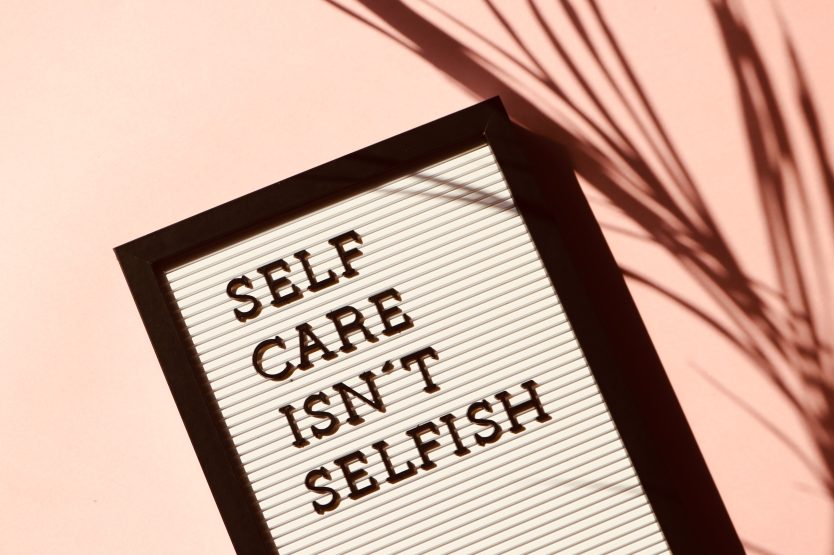You know the drill. When the air masks drop down, you’re supposed to put on your own mask first, before you put on anyone else’s. We accept the logic here: if you don’t take care of your own oxygen needs, you’re going to pass out (literally) before being able to help others.
This logic is all well and good for imaginary, life-and-death scenarios. But when it comes to our everyday life, it often goes out the (airplane) window. And all our needs go out that window, too, while we’re busy taking care of everyone else in our life.
Women often shame themselves out of self-care because self-care is, well, selfish. And as women, we’re told that there’s nothing worse than being selfish.
So today, we’re here to give you permission: be selfish! Find self-care that resonates with you, and stick with it, come hell or high water. We promise: you’re going to love the benefits.
What Is Self-Care?
Self-care is about all the things we can do, big or small, to “achieve, maintain, or promote optimal health and well-being.” 1 It’s not a new idea, but it’s a term that we’re using more and more, as we become more aware of the importance not just of our physical health, but of our mental and emotional health as well.
Why Be Selfish?
OK, maybe self-care sounds good in theory, but it’s just an excuse to get your nails done every now and then, right? Wrong. Self-care can and should be an integral part of your daily life. And when it is, you can expect to see many benefits.
For example, one study found that students who engaged in regular self-care reported less stress and a higher quality of life. 2 And studies also show that nurses can use mindfulness practices to reduce burnout and improve job satisfaction. 3
Many types of self-care – going on that walk, committing to a do-able exercise routine, eating more fresh food, drinking more water, making sleep a priority – are going to have a direct impact on your physical health.
The right self-care can also help reduce stress and anxiety, help you relax, boost your self esteem, and support your mental health and relationships. 4
Redefine Self Care
Don’t get us wrong. For some people, treating yourself to the nail salon may be a critical part of their self-care. But self-care is about so much more than going to the spa.
Sadly, we live in a consumer-driven society, and many companies have jumped onto the self-care bandwagon. You’d be forgiven for thinking that self-care is synonymous with spending hundreds of dollars on beauty care products and massages.
Again, if you love beauty care products and massages, no judgment here! But we also invite you to remember that self-care is about all the things you can do to promote well being. And you know how they say the best things in life are free? They mean it! Here are some examples of self-care that won’t cost you much more than dime:
- talking with a friend
- dancing
- singing in the shower
- reading a poem
- coloring or painting or drawing
- volunteering to babysit
- helping a neighbor
- blowing bubbles
- having a cup of tea
- going to the park
- watching the clouds
- feeding the birds
- baking (maybe start with these ‘guilt-free desserts!’)
Feeling inspired? Or not seeing anything on this list that quite does it for you? Make your own list of nourishing activities, and keep it handy for when you’re having a bad day or a low moment.
And try to learn how to bring more mindfulness into your day. If you do, you might find that there’s opportunities for more self-care all around you.
Do you rush through your shower, lost in thought? Can you slow down and enjoy the warm water on your skin? Instead of sticking in your ear buds, could you smile and say hi to your bus driver in the morning, creating a little human connection? What about giving yourself a little shoulder massage between emails at work?
The idea here is that a little goes a long way. The more we can find little moments of joy throughout the day, the calmer and more fulfilled we’ll be.
Finally, it’s also important to note that self-care isn’t always pretty and Instagram-able. Yes, it can be picnics in the park. But it can also be making time for the less fun but necessary health care that will improve your health.
For example, seeking help for incontinence and other chronic conditions is a form of self-care. Preventative health care is also critical to your overall well-being, so be sure to schedule and keep your routine exams.
So go ahead. Working on achieving a better work-life balance. Make that pumpkin smoothie. Eat the cookies. Make the dentist appointment you’ve been putting off. Be ‘selfish.’ We dare you!
















